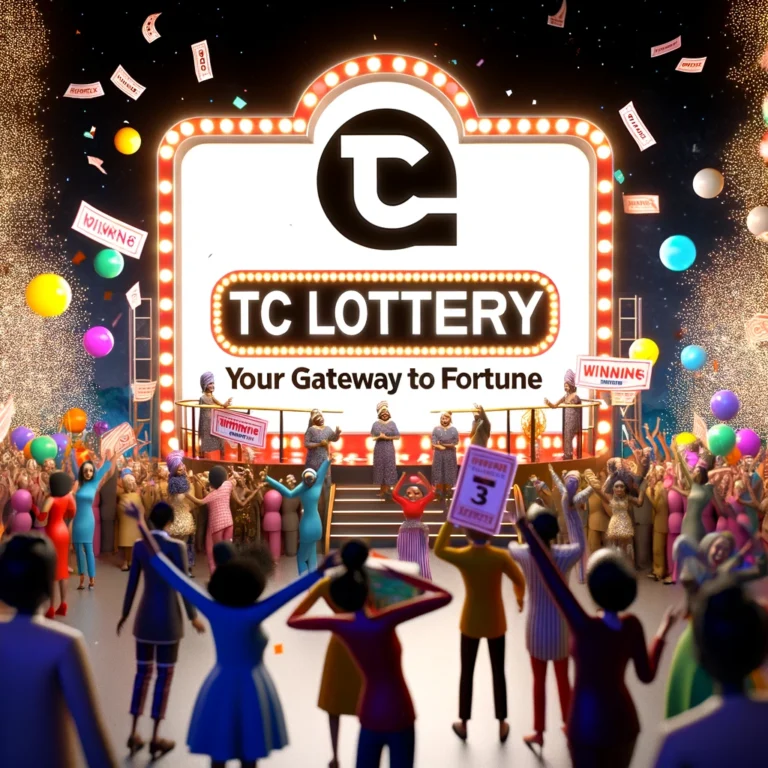
The image vividly portrays a festive lottery celebration scene under the banner of “TC Lottery: Your Gateway to Fortune”. In the center, a large, illuminated sign displays the title, casting a warm glow on the scene. The crowd around the sign is diverse, with people of various ethnic backgrounds, each holding and waving a lottery ticket. These individuals display expressions of joy and excitement. The setting is adorned with sparkling lights, vibrant balloons in multiple colors, and falling confetti, enhancing the celebratory mood. The overall atmosphere is jubilant and colorful, effectively capturing the thrill and anticipation of a lottery win.
The eligibility criteria for participating in the TC Lottery typically include the following key points, though it’s important to refer to the specific rules of the lottery for precise details:
Age Requirement: Participants must usually be of legal age to gamble in the jurisdiction where the lottery is offered, often 18 years or older.
Residency: Some lotteries require participants to be residents of the state or country where the lottery is operated, though many are open to non-residents as well.
Valid Ticket Purchase: Participants must purchase valid tickets from authorized retailers within the lottery’s operational area or through approved online platforms, if available.
No Affiliation: Employees and immediate family members of the lottery organization, and other affiliated companies, may be prohibited from participating to avoid conflicts of interest.
Compliance with Laws: Participants must comply with all local, state, and national laws applicable to lottery participation.
Tickets for the TC Lottery can typically be purchased through several avenues, depending on the setup and regulations of the lottery system. Here are common places where lottery tickets might be available:
Retail Locations: Tickets are often sold at authorized retail outlets, which can include convenience stores, gas stations, and supermarkets. These locations usually have signs indicating they sell lottery tickets.
Official Lottery Kiosks: Some lotteries operate their own dedicated kiosks in shopping malls and public places where tickets can be purchased directly.
Online Platforms: Many modern lotteries offer online ticket purchases through their official websites. This allows participants to buy tickets from their computers or mobile devices.
Lottery Apps: Some lotteries have their own mobile applications, available for iOS and Android, where users can buy tickets, check winning numbers, and receive notifications.
Third-Party Vendors: In some regions, third-party websites and apps are authorized to sell lottery tickets. However, it’s crucial to ensure that these platforms are legitimate and officially recognized by the lottery authority to avoid scams.
The frequency of drawings and the timing of result announcements for the TC Lottery can vary based on the specific rules and setup of the lottery. Here are some common formats for lottery drawings:
Daily Drawings: Some lotteries have daily draws, typically in the evening, allowing participants to play and potentially win every day.
Weekly Drawings: Many lotteries hold their drawings once or twice a week, often on set days like Wednesdays and Saturdays. These are common for major lotteries with larger jackpots.
Special Draws: Occasionally, lotteries might hold special drawings, such as super draws or holiday-themed draws, which can occur at different times from the regular schedule.
As for the announcement of results:

the moment of a lottery draw for the TC Lottery, set in a studio with a lively and suspenseful atmosphere. If you need any adjustments or additional images, feel free to let me know!
Whether winners of the TC Lottery can choose to remain anonymous depends on the specific laws and regulations of the jurisdiction in which the lottery operates. Here are some general considerations and implications of choosing anonymity or public disclosure:
Anonymity Policies:
Implications of Remaining Anonymous:
Implications of Public Disclosure:
The tax obligations for winners of the TC Lottery can vary significantly based on the size of the prize and the legal jurisdiction in which the lottery is played and the prize is claimed. Here are some general aspects to consider:
Federal and State Taxes:
Prize Size:
Lump Sum vs. Annuity:
Regional Variations:
International Winners:
